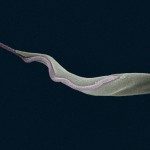Link to Pubmed [PMID] – 8557342
Infect. Immun. 1996 Jan;64(1):215-21
The role of gamma delta T cells in the immunopathology of Chagas’ disease is evaluated by monitoring the course of Trypanosoma cruzi infection in mice lacking gamma delta T cells after disruption of the T-cell receptor C delta locus. Levels of parasitemia, states of lymphocyte activation, and levels of lymphokine production as well as tissue pathology are compared in delta knockout mice and their littermates in acute and chronic phases of infection. Although the levels of circulating parasites do not significantly differ in the two groups, mortality scores and numbers of inflammatory lesions of skeletal and cardiac muscles are lower in gamma delta T cell-deficient m ice than in littermate controls. Furthermore, polyclonal lymphocyte activation, as measured by proliferative activities and numbers of B- and T-cell blasts in the spleen, are reduced in deficient mice in the acute and chronic phases of infection. Levels of gamma interferon mRNA obtained from total spleen cells, known to be a critical lymphokine in resistance to T. cruzi infection, are significantly higher in uninfected gamma delta T cell-deficient mice than in control animals and slightly above levels for littermates in the course of acute infection. Interestingly, however, in chronic phases, the levels of this lymphokine are not statistically different between the two groups of mice. These results indicate that gamma delta T cells do not play a crucial role in parasite clearance during the acute phase of the disease but contribute to the mechanisms leading to tissue damage and pathology.

